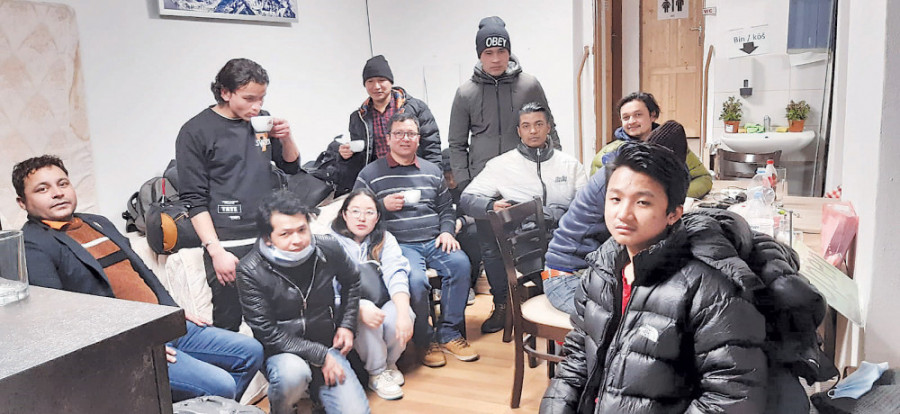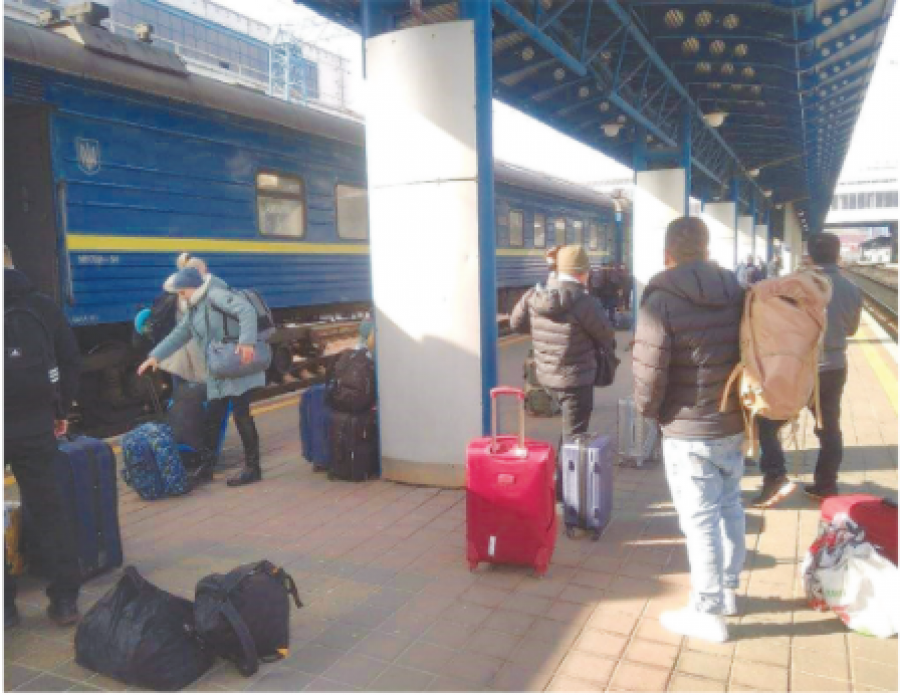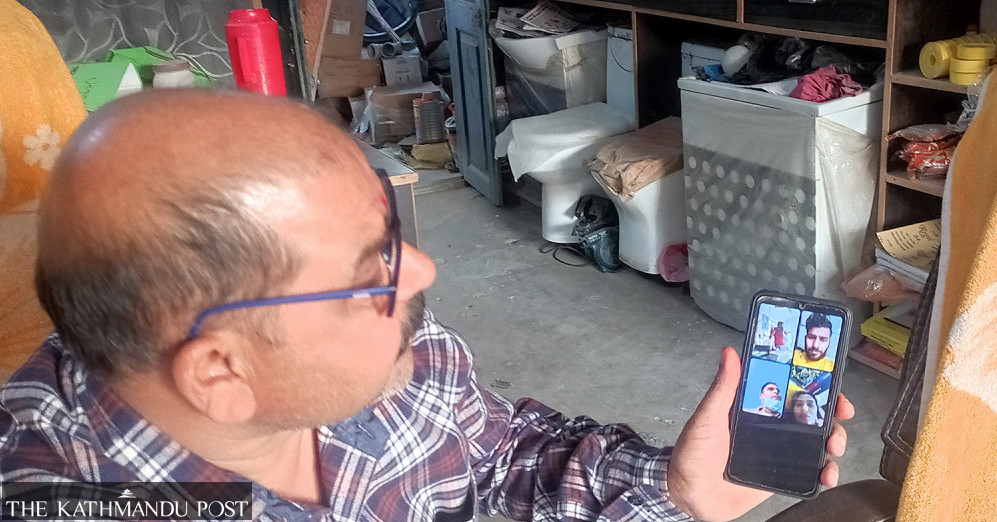
Nepali nationals displaced from Ukraine at a Nepali restaurant in Bratislava, Slovakia. Jaya Prakash Shiwakoti, the owner of the restaurant, has turned his business place into a shelter for Nepalis feeling the war.
When Jeni Tamang left Nepal in 2020 for Ukraine to pursue her bachelor’s degree in nursing, she was assured of direct admission in the university.
Xavier International Education Consultancy in Tanahun also said she would easily get a part-time job, enough to earn a living there, she said.
However, when she landed in the eastern European country, things were completely different from what she had been promised. She had to study the Ukrainian language for one year. And getting a part time job was not easy as the consultancy had assured, she said.
When Russia on February 24 invaded Ukraine in what Russian President Vladimir Putin called a special military operation, Tamang had just started her bachelor's degree after completing the language course.
As the war had started, there was no other option for her than to flee.
“It was a double whammy. First, because the education consultancy didn’t give the right information and now I have to leave the country after the Russian invasion,” Tamang told the Post over WhatsApp from Warsaw, the capital of neighbouring Poland. “I don’t have anything now except my phone and passport.”
Two days after the war began, Tamang and her friends first took a cab from Kyiv, the capital of Ukraine, on February 26 and then walked the whole day to reach the Polish border.
She said each of their friends had a bag when they left their residence.
However, they had to discard their bags as it wasn’t possible to carry them while they had over 45 kilometres to walk.
“I am happy that I have survived,” she said. “I will wait for a few days for the situation to improve. If not, I will return home.”
It has been seven days since the Russian invasion of Ukraine, and Putin’s forces have reached Kyiv. Russian forces have shown no signs of retreat even as the world has condemned the attack. The United Nations General Assembly has called a special session to discuss and vote on a resolution to isolate Russia, but Putin appears to be unfazed.
There has been no progress in talks between Russia and Ukraine in Belarus.

Nepalis at a railway platform, in Iviv, a city in western Ukraine some 70km from Poland border. Photo courtesy: Binod GaihreTamang said the manager of the consultancy has been out of contact for months after they complained about his false promises.
“Even I am unaware of his whereabouts for the last four-five months,” Sujan Tiwari, a former staff at the consultancy, told the Post. “I have been searching for him because my salary is due.”
Over 300 Nepalis, mostly students, were said to be in various cities of Ukraine, mainly Kharkiv and Kyiv.
Nepali students, who have left Ukraine to save their lives, say the consultancies through which they reached the Eastern European country didn’t provide them the right information while sending them.
Bishnu Sunar had left Nepal in December last year for Kharkiv to pursue a bachelor’s course. But she had to leave the country even before her temporary residency certificate was prepared.
“It generally takes less than a month to prepare the certificate. However, I didn’t get it for three months,” said Sunar, who is from Nepalgunj, over WhatsApp from Poland. “Now I won’t be able to enter the country again even if I want to after the situation improves.”
Sunar will have to restart the admission and visa process to enter the country. It will cost her around a million rupees, which “my parents are unable to afford,” she said.
“I will look for options to stay in Poland or any other country. If that doesn’t happen, I will return. Do I have any other choice?” she said.
Multiple students fleeing Ukraine the Post spoke to said they are expecting support from the Nepal government to return home as they don’t want to impose an additional burden on their parents who have already spent huge amounts on them.
Each student spent a minimum of Rs1 million to enter Ukraine. They spent an additional Rs200,000 on an average in the last one year.
“Ukraine isn’t the right academic destination as the consultancies claimed even if there was no Russian invasion,” said Nabin Rawal, a bachelor’s level student in a Ukrainian university in Odessa over WhatsApp from Poland. “I am expecting Nepal government’s support to return home.”
As of Tuesday morning, 301 Nepalis have crossed the Ukrainian border and reached Poland, Slovakia, Romania and Hungary, according to Nepal's Embassy in Berlin, Germany.

Ramnath Chaurasiya of Rajbiraj, in a video call, talks to his son Rakesh Chaurasiya, a MBBS student at Ukraine's Kharkiv National Medical University. Rakesh, during the call, informed that he has fled the war-torn city of Kharkiv and is heading towards the Poland border. Post Photo“So far we have no information about any evacuation flights from the Nepal government,” said Sahara Chaulagain, a third secretary at the embassy. “We are telling our people to arrange their flights on their own if they want to return.”
Records at the Ministry of Education show the trend of going to Ukraine increased from last year only.
The ministry, which issued 65 No Objection Certificates in 2020, issued 678 certificates last year to students headed for Ukraine.
The ministry had issued 77 such certificates in just 24 days in 2022.
“We stopped issuing No Objection Certificates from January 25 as tensions were building up between Russia and Ukraine,” said Hari Niraula, chief of the Study Abroad Permission Section at the ministry.
“There was huge pressure from students, guardians and educational consultancies to continue issuing the certificates. The Russian invasion a month later has proved that our decision was right.”
As the Russian invasion entered the seventh day on Wednesday, the Russian army was bombarding places like the capital Kyiv and other cities, including Kharkiv. Russia, according to international media outlets, claims to have taken control of the port of Kherson, situated on the right bank of Dnieper River connecting to the Black Sea.
Nepali students who have fled to Poland, meanwhile, are furious at the Nepal government because it appears completely oblivious to their and other fellow citizens’ sufferings.
“There are representatives from different countries helping their citizens in Ukraine, on the borders and other bordering countries but our government is absent,” said Srijana Moktan, who had gone to study master’s in business in January last year, from Poland over WhatsApp.
“Our neighbours India and China have started evacuation flights, but there is no communication from our government. Does the government even care about hundreds of its own people who are trapped in war?”













